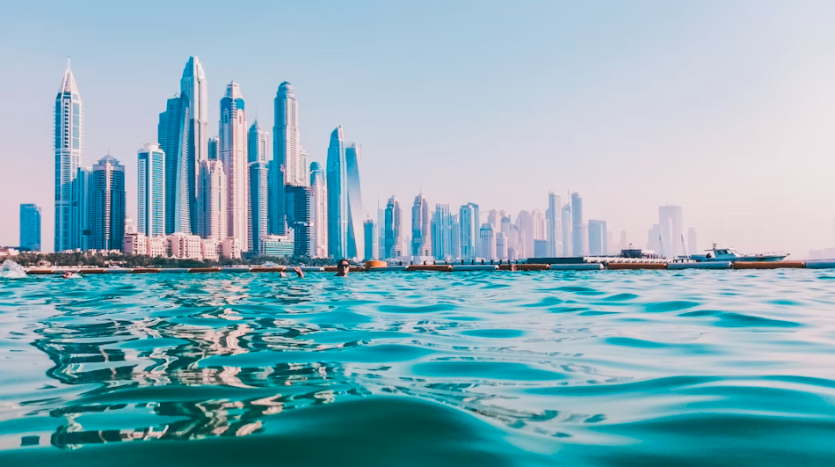Why and how to move to Dubai: A complete guide for French nationals
Do you have an expatriation project in mind? Would you like to move to Dubai, but don't know where to start? At Dubai Immo, we are often confronted with people who share the same desire as you, but don't really know where to start. That's why we've put together a comprehensive guide to help you get started.
Here we go!
Why choose Dubai as your destination?
More and more people are moving to Dubai. In a recent article, we explained how and why 50,000 people moved here between January and June 2023.
Job opportunities in Dubai
Dubai is a city that is attracting more and more professionals. Indeed, it's very easy to get established here. There's no shortage of jobs on offer (particularly in growth sectors such as new technologies, goods and services, etc.). What's more, salaries are substantial! The average salary is estimated at 5,380 euros per month, compared with 2,596 euros per month in Paris.
Last but not least, taxation. In Dubai, there is no income tax. The same applies to corporate income tax. A living environment that attracts more and more entrepreneurs and professionals wishing to evolve in an international, dynamic and knowledge-rich world.
Lifestyle in Dubai
What about lifestyle? In Dubai, life is simple. Everything is in place to help you make the most of it. Public transport is on time and perfectly maintained, and the streets are clean. From a security point of view, Dubai is one of the safest cities in the world, with a crime rate of 0.66% in 2019, one of the lowest on the planet.
Add to this the possibility of traveling anywhere in the world, thanks to two international airports, the ability to go to the beach and enjoy the sea at any time of day... Or to enjoy a dense and rich cultural life. Dubai boasts a large number of museums, including the Dubai Museum and theEtihad Museum.
From a sporting point of view, there's plenty to keep sports fans entertained, with numerous golf courses, skiing, desert rallying, thrill-seeking activities and much more besides (soccer, basketball and paddle tennis fans, for example, will find courts just about everywhere)!
Finally, what about the local culinary scene? In Dubai, the greatest chefs and restaurants compete to offer locals and residents alike true moments of relaxation and pleasure. Perfectly crafted, colorful dishes for couples and families to enjoy together!
Climate and environment in Dubai
The question of Dubai's climate often comes up. The first thing you need to know is that it's warm and sunny... all year round. The average year-round temperature is 29 degrees. The hottest months are the summer months, from May to September, when average temperatures can reach 42 degrees (or much higher locally or in the desert). It goes without saying that in Dubai, it's best to be sun- and heat-tolerant if you want to settle down.
Rainfall, on the other hand, is relatively low and irregular. In fact, the annual average doesn't even exceed 100mm, or barely one day of rain a year. As for the rest, you may well have to contend with sandstorms, especially in summer. Rest assured, however, that they are generally short-lived and not very intense, at least in the city.
Organizing your move to Dubai
Choosing an international moving company
Are you planning to move to Dubai ? It goes without saying that you won't be able to transport your belongings yourself, either by plane or by car. So you'll need to hire an international moving company. There are many such companies, including AGS Déménagement, Biard Déménagement and Jumeau, to name but a few. Don't hesitate to contact them, talk to them and ask for a full quote!
The key stages in organizing a move
Moving internationally isn't as quick and easy as moving to a house in the neighboring village.
Once you've decided which international moving company to work with, the first step is to calculate the value of your belongings. We advise you to list everything and make a general estimate. In any case, your moving partner will be obliged to provide you with one. You'll then be able to compare.
The second step is to organize the schedule! Contact the company, set a date for furniture collection and transport, and a date for arrival and reception. Once all this has been done, you can start tidying, cleaning, sorting and preparing your belongings.
A word of advice: take the essentials with you. Cargo ships arriving in the Emirates are often blocked for several weeks for inspections. Once the goods have been released, they are delivered directly to your home, to the address given to the carrier. You can then take delivery and start your new life in the Emirates!
Documents required for a move to Dubai
A number of documents are required for a move to Dubai. The first thing to provide is a copy of your Visa (or a copy of your residence permit or UAE ID if you have one).
Add to this a copy of your passport and a handwritten letter, officially requesting the right to impose your move to the attention of the UAE Customs and Port Authority. Your mover will also need to provide a legal power of attorney, so that he can take charge of your belongings once there.
Moving costs in Dubai
As you can imagine, moving to Dubai represents a real budget. But just how much? We take stock of this central question for your expatriation project.
Estimated moving costs
On average, an organized move from France to Dubai is estimated to cost between 4 and 5,000 euros. It all depends on the type of move you choose. For example, a 33m3 container costs between 1850 and 2100 euros. If you need 2 or 3, depending on the size of your family and the number of items to be moved, you'll need to multiply. Please note that the price per container can change quite rapidly, depending on economic conditions.
You can also opt for removal by air. For a similar total (in terms of surface area), however, you'll have to reckon with higher costs, with an average price (for 33m3) of between 2,300 and 2,600 euros. Here again, you need to multiply by the number of containers chosen. The advantage here is that waiting time is much shorter (a few days maximum by air, as opposed to nearly a month of transit and inspection by ship).
Hidden costs
As with all major projects, certain costs can be added to the initial estimate, inflating the bill a little. Among these hidden costs are visa fees (which can also be covered by the company).
Add to this the cost of plane tickets, storage costs in the event of delays, delivery or arrival). You can also take out insurance to cover all your belongings, which will cost you some money, but will allow you to leave with a lighter mind.
Selling your car in France before moving to Dubai
Why sell your car before you leave?
There are three main reasons why it is highly recommended to sell your vehicle before moving to Dubai. The first is financial. Sending a vehicle from France to the Emirates is extremely expensive! Secondly, there's the question of paperwork. Sending a vehicle from France to the Emirates is a real administrative headache, with lots of documents to print out, provide or send.
Last but not least, cars cost much less in Dubai than in France and the rest of the European Union. This is due in particular to competition between dealerships, as well as to relatively low taxes and customs duties. Finally, many vehicles are purchased for cash.
How do I sell my car in France?
There are several ways to sell your car in France. The first is to put it on line, on a dedicated site (like Le Bon Coin) from which you'll find a good number of ads and where you can post yours. A second good option is to go through a dealer, who will take the time to sell your vehicle directly from their garage. On the day your vehicle is sold, you'll need to fill in and sign the cerfa n°15776 form with the buyer, the certificate of transfer, the certificate of administrative status, receive your bank cheque, etc...
Moving to Dubai
Choosing the right neighborhood to live in Dubai
Do you know Dubai? Do you know where you'd like to settle? There are plenty of options! In fact, there are many different neighborhoods in Dubai, each with its own advantages:
- some are very close to the center, such as Downtown, Business Bay,
- Others, such as Arjan and Jumeirah Village Circle, are a little more out of the way and attract many expatriates,
- Some are very family-oriented, with quick access to schools, parks and other health facilities, like Damac Hills,
- Finally, some are a little more remote or target a more affluent clientele, such as Rashid Yacht & Marina or The Pearl Jumeirah.
Do your own research, discuss the subject with a local real estate agent and make routine visits.
Understanding Dubai's healthcare system
According to figures from the Dubai Health Authority(DHA), Dubai has 3,700 clinics, 30 hospitals (including American Hospital, The French Clinic and Aster Cedars Hospital) and almost 40 health centers. But the local healthcare system doesn't work like the French one. While the services on offer are top-of-the-range, you'll need to take out health insurance if you want to expatriate. This is compulsory. It covers quite a few things, including :
- visits to the GP,
- medical emergencies,
- conventional tests, such as blood sampling,
- the cost of prescribed treatments,
- maternity follow-up,
- physiotherapy.
For better coverage, you can take out a provident contract with a private organization.
Schooling in Dubai: an option for children
What about schooling, if you come with your family? Rest assured, Dubai's education system is of the highest quality. Your children will be able to follow the French curriculum and learn foreign languages. We discuss this in our dedicated article "The best French schools in Dubai". There are 5 of them, and you can study from primary school to Terminale:
- Lycée Français International Georges Pompidou - Sharjah
- the private French-speaking Lycée Libanais
- Lycée Jean Mermoz
- AFLEC International High School
- International Concept for Education (ICE)
Daily life in Dubai: culture, leisure activities and customs
Life in Dubai is hectic and active. Here, you can take part in a wide range of meetings, sports and cultural activities. The city is an international melting pot, and this is reflected in everyday life.
For example, you can play basketball, paddleball or golf, as there are plenty of courses to choose from. You can also join a club or do other sports that are found just about everywhere (judo, running, boxing etc...)... Or not at all, like camel racing.
In terms of culture, Dubai boasts numerous museums, including the Dubai Museum, the Saruq Al Hadid Archaeological Museum, the Etihad Museum and the Museum of the Future. You'll also have access to a number of cinemas, and can take advantage of the sea, desert and deep-rooted customs to learn more about local history and customs.
Well, from the point of view of customs... There are a lot of them! Firstly, the clothes worn, called the dishdasha, which is none other than the traditional, loose-fitting garment that falls to the ankles. Certain habits must also be observed when greeting locals (shaking hands upwards between men). You must also respect sensitive subjects, such as religion, local authorities, etc...
Finally, there are frequent public holidays and festivals. Firstly, the weekend takes place on Fridays and Saturdays. Public holidays include Eid, Arafat, Muslim New Year and Mawlid. The national holiday takes place on December 2. It celebrates the departure of the British colonists and the independence of the Emirates.
Preparing to leave for Dubai
Administrative formalities before departure
In addition to finding an international mover and packing, it is essential to have all your official documents (marriage contract, driving license, etc.) translated and certified. For this, don 't hesitate to contact the Ministry of Foreign Affairs or the Embassy of the United Arab Emirates in Paris.
The second thing to do is to contact the French embassy in the Emirates, to inform them of your imminent arrival. You will then be able to register with the consular register of French nationals abroad (not compulsory, but recommended).
Last but not least, you must notify your change of address to the French post office (La Poste), in order to organize mail forwarding. You must also inform your tax office in France of your new address. As a reminder, your taxation will depend on your new tax household. You can find out more on the subject by visiting the public service website.
Psychological preparation for the move
Is this your first expatriation? Dubai isn't exactly next door. But rest assured, everything is taken care of in Dubai. You need to know how to organize yourself and respect the deadlines imposed, even though the administrative procedures are not that onerous or complex.
It all starts with the translation of your documents, which will then enable you to submit your visa application. At the same time, you'll need to find a moving company. All you need to do is make sure that everything is ready on time.
Don't hesitate to ask friends and family for help, or to get in touch with the French expatriate communities in the Emirates, who will be able to help you (as will the consular services). And don't forget to book your tickets.
Once you've packed your bags, there's nothing left to do but fly home and unpack. You've arrived in Dubai, and are ready to start your new life! Remember, flights from Paris to Dubai are direct and take "only" 6h30 on average.
Dubai entry formalities
Obtaining a residence visa in Dubai
There are several types of visas available for moving to Dubai:
- The Entrepreneur Visa: valid for 3 years if you open your own business, 5 years for investors, partners or freelancers with AED 15,000 in monthly income (approx. €3,750) and the Golden Visa, a visa valid for 10 years for real estate investors (minimum investment of AED 2 million).
- Work visa : your future employer or local sponsor will have to apply on your behalf. To obtain it, you'll need to provide a few documents, such as a medical examination certificate, a copy of your diplomas, your passport and passport photos.
- Worker's visa: this visa is intended in particular for self-employed people working remotely in the media, education and technology sectors. It allows you to stay for a year, and can be obtained in just two weeks!
- Retirement visa: this is the visa for retired people. It is valid for 5 years and is renewable on condition that you buy a property worth AED 2 million (or more), earn at least AED 20,000 (around 5,000 euros) a month or have at least AED 1 million (around 250,000 euros) in your bank account.
Customs formalities on arrival
Customs formalities on arrival in Dubai are not complex. To save time on the process, you can also use the iDeclare application, which simplifies customs clearance for passengers. You can declare the goods you are carrying, your personal effects and any cash you may have.
If you have nothing but your passport in your pocket, simply go through customs on arrival at the airport. The authorities will then check that everything is in order. If everything is OK on your side, as it is on theirs (and it should be), you can then cross the border and officially enter Emirati territory.
Accommodation in Dubai
How to find accommodation in Dubai
Finding accommodation in Dubai is easy. On the one hand, there's plenty on offer, so you shouldn't have any trouble finding what you're looking for, whether it's a new build, a property under construction, an apartment or a villa!
The second thing to consider is the question of support: it's best to turn to a real estate agency. They know the local market inside out, whether you're looking to buy or rent.
Trusting a professional to help you find your future home in the best possible conditions. You'll avoid unpleasant surprises and benefit from personalized support, at the best possible price.
The peculiarities of the Dubai real estate market
The Dubai real estate market is different from the French market. Particularly if you're looking to buy. Firstly, there are no banks involved in the sales process. So there are no fees! Purchase payments are made at regular intervals. These are announced in advance by the property developer (in the case of a new-build purchase).
The second point is that, if you are a tenant or wish to rent out your property, the rent must be paid not on a monthly basis, but all at once, for the rest of the year. For example, if your rent is 1,000 euros a month, you'll have to pay 12,000 euros all at once.
Banking in Dubai
Opening a bank account in Dubai
As a French citizen (or a French-speaking citizen from Belgium, Switzerland, Luxembourg or Canada), you'll need to open a bank account in Dubai. There are 5 steps to follow:
1. Choose your future bank: Dubai has many international banks, such as Emirates NBD, Dubai Islamic Bank, Mashreq Bank and others. Do your research and decide which one offers the best options and the best deal for you, your business or your family.
2. Prepare the necessary documents: While the list of documents may vary from bank to bank, in all cases you will need your passport, a copy of your Dubai residency visa, proof of address (e.g. a utility bill) and recent bank statements from your French (or other) bank, which you have just left.
3. Make an appointment at the bank: Bring your documents. The advisor will then guide you through the various steps to open your account.
4. Initial deposit and signature of documents: To finalize the account opening, you'll need to make an initial deposit. Once you've provided all the required documents and deposited your money, you'll need to sign the documents presented to you.
5. Account activation: After signing the documents, the bank will activate your account and provide you with your account details, such as account number and online access information etc... That's all!
Understanding the banking system in the United Arab Emirates
The UAE banking system is regulated by the Central Bank of the Emirates. It is this bank which announces rules designed to ensure the stability and security of the national banking system. The banking system is made up of local and national banks, as well as international banks (which are subsidiaries).
In addition to traditional services (deposit, credit card, SEPA transfer, etc.), the UAE has also set up a confidentiality system. Please note, however, that the UAE is not a tax haven, and agreements have been signed allowing the exchange of data and tax information. Nevertheless, the banks are relatively discreet.
In terms of payment methods, it's pretty standard. Dubai is highly developed and allows payment by cryptocurrency, credit card, check or even cash. So you won't feel out of place. A fast, secure and efficient banking system, just like the Emirates in general.
The job market in Dubai
How to find a job in Dubai
There are several ways to find a job in Dubai. Firstly, you should know that networking works very well in Dubai, so don't hesitate to build up a small network of recruiters, professionals and entrepreneurs!
To do this, make the most of meetings, meetups and social networks. You can also get in touch with the French CCI (Chamber of Commerce and Industry) in the Emirates.
Online searches, using sites such as LinkedIn, GulfTalent, Indeed and Bayt, can also pay dividends. And don't hesitate to turn to recruitment agencies, or send in an unsolicited application. It costs nothing!
Understanding the Dubai job market
The job market in the Emirates is relatively dynamic. Things move fast, expectations are high and hours can sometimes be longer than in France. But salaries are much higher, as are the associated benefits (housing, transport, healthcare)... And the environment is much more international, much more stimulating.
Another point is that, while hierarchy is still very much alive and well in the Emirates, the country is becoming increasingly open to the question of balancing work and well-being. For example, digitalization is encouraging telecommuting! Finally, weekends are not Saturday and Sunday, but Friday and Saturday.
Driving in Dubai
Getting a driver's license in Dubai
Already have your driver's license and want to use it in Dubai? If you're a resident, you'll need to obtain a local license. To do this, you need to go to the Dubai Road & Transport Authority, with all the required documents. These usually include your driver's license, passport, eye test, etc. Converting your European driver's license takes just a few minutes at the Dubai RTA. All you need to do is provide the required documents, and you'll leave directly with your Dubai driver's license. You'll find all the information you need on the dedicated website.
If you don't have a driving license, you can take one locally. The average cost is between 4,500 and 7,000 AED, equivalent to 1100 to 1800 euros. It is divided into two parts, with a code session and a driving session. As in France, if you fail the test, you'll have to take it all over again!
Understanding the rules of the road in Dubai
Driving rules in Dubai are similar to those in France. Seatbelts must be worn, driving is on the right-hand side of the road, it is forbidden to drink and drive and, of course, you must respect the speed limits (80 km/h in built-up areas, 100 km/h outside built-up areas and on major roads, and 120 km/h on freeways). Last but not least, as mentioned above, a driving license is required! Note that a tolerance of 20 km/h is applied for speed cameras. If the speed limit is 60 km/h, you can drive up to 80 km/h without being flashed.










